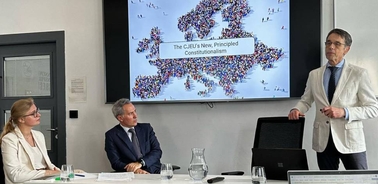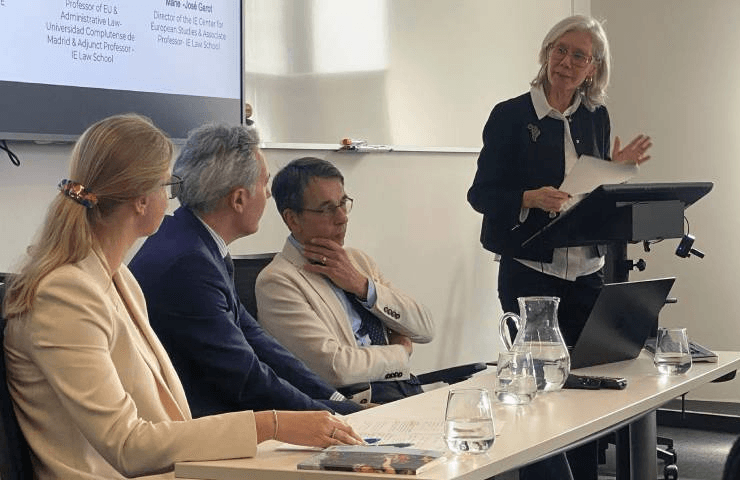- Home
- We Are Law School
- News
- The Constitutional Core Of The European Union And The Court Of Justice
The constitutional core of the European Union and the Court of Justice

Professor Armin von Bogdandy, director at the Max Planck Institute for Comparative Public Law and International Law, joins IE Law School professors to discuss the constitutional foundations of the European Union.
On March 25, the IE Center for European Studies was honored to host Professor Armin von Bogdandy, director at the Max Planck Institute for Comparative Public Law and International Law, and Professor of public law at Goethe University Frankfurt am Main, for a deep dive into the constitutional core of the European Union as interpreted by the Court of Justice. Marie-José Garot, director of the Center and Associate Professor at IE Law School, moderated the event.
Joining Prof. von Bogdandy were Daniel Sarmiento, Professor of EU & administrative law at Universidad Complutense de Madrid & Adjunct Professor at IE Law School, and Yuliya Kaspiarovich, Assistant Professor at IE Law School. Following introductions, Garot stressed the importance of reflecting on the constitutional foundations of the European Union in these troubled times. She then posed the opening question: "What constitutes the constitutional core of the European Union?"
"The future of democracy depends on active legal engagement and vigilance."
Prof. von Bogdandy
A deeper look into the constitutional core
Prof. von Bogdandy opened his lecture by remarking that speaking on something he feels so deeply about is a privilege. "As members of European society, this is something we need to get right. We need to get the new, principled constitutionalism right," he began.
He argued that the Lisbon Treaty marked a new step in the evolution of EU constitutionalism. "After the Lisbon Treaty came into force, the Court of Justice added a new layer of constitutionalism," he explained. Articles 1 and 2 of the Treaty on the European Union are two pivotal provisions in this respect.
These provisions can strengthen national democracies rather than weaken them. In fact, Prof. von Bogdandy views EU law as a tool for national improvement, providing checks and balances to prevent democratic backsliding and allowing supranational institutions to safeguard constitutional principles when national systems fail.
"The Lisbon Treaty marks a new stage in the process," explained Prof. von Bogdandy. "The aim of constitutionalism is to promote peace, its values and the well-being of its peoples." Constitutionalism is about society, which Prof. von Bogdandy said is his favorite word in the treaty. It frames the new type of European constitution because it frames Europe as a collective singular. "We are not a people, we are not a nation, we are not a state, but we are a society."
The professor ended his lecture with a call to action, explaining that legal scholars, judges and policymakers must work together to reinforce democratic principles.
Opening the discussion
Following Prof. von Bogdandy’s presentation, discussants Prof. Sarmiento and Prof. Kaspiarovich raised important questions. Prof. Sarmiento stressed the importance of functionalism in the development of EU constitutionalism. He also believed that the EU, as a liberal democratic project, has to find ways to survive in this environment, and for the Member States, the Union serves as a helpful tool because it offers protection. "The EU is playing the role of a shield, which is serving a unique function. Most of the great steps forward of the European integration process have been taken during crisis."
Prof. Kaspiarovich first addressed the semantics of the constitutional core of the EU. "Could the variance in terminology lead to confusion or interpretive challenges within the court system?" She then challenged the EU’s role in international law, especially its interactions with international organizations and other global actors. She finally engaged in a reflection on the principle of mutual trust and asked, "What is the added value of this principle in the constitutional core of the Union?"
The floor was also open to audience members. One audience member raised a question about the EU’s reliance on contributions from Member States and the principle that "no taxation without representation" was a key component of the US federalization process. The main concern was whether the EU, lacking direct taxation power, is missing an opportunity to create a more robust, federal-like system.
Another raised the issue of whether the EU is merely defending existing structures or whether it has the potential to construct something new and transformative, especially with current global challenges, including external threats from Russia and the US. This led another audience member to question if there ever has been a true "constitutional moment" in Europe. The lack of widespread public engagement and varying levels of participation in EU-wide decisions further complicates the idea of this moment.
Closing comments
Prof. von Bogdandy concluded that there are clear tensions between defending the status quo and pushing for more meaningful integration and innovation within the EU. While some are cautious about overambitious plans, others see a moment of opportunity, particularly in the face of today’s global challenges.
Garot ended the event by thanking each participant for their time and knowledge on the subject, inviting the audience to attend the next seminar for more conversations and friendly debate.
About the IE Center for European studies
The IE Center for European Studies is a space for reflection and dissemination on current issues related to the European Union. Its purpose is to contribute to key debates for the consolidation of the European integration project, from an economic, social, and legal perspective.
